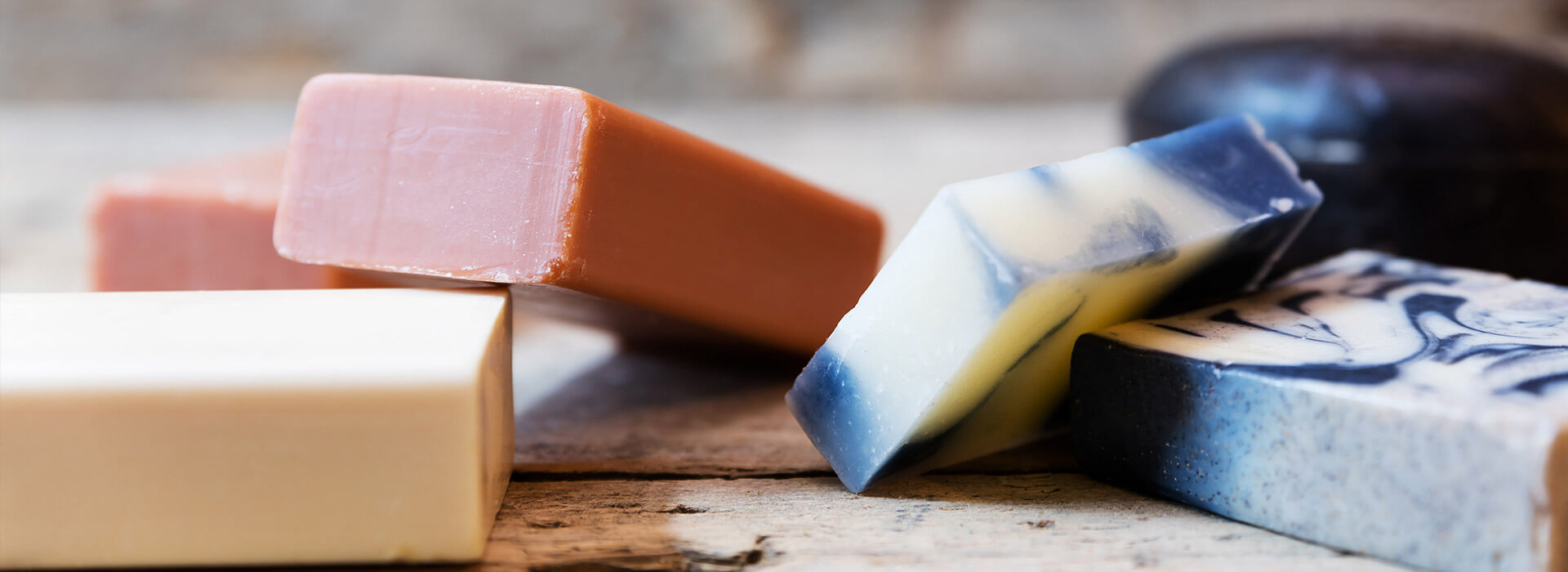
Glossary
An explanation of our ingredients and parfums and their natural qualities.
All my products contain the cleanest ingredient deck. I only use the finest oils with the organic percentage in line with the Soil Association organic guidelines. In all, we could make a far cheaper, inferior product and make a way higher margin (way, way higher!) but choose not to. I put my name to every label and stand by the ingredients because I am so proud of the product and genuinely want to change the market place – from day one it has been about making pure, natural soap accessible to all. That is what gets me out of bed in the mornings. In all the supermarkets we are in, Little Soap Company was the first organic bar soap to line their shelves – and to enable having an organic alternative for consumers to happen amid their weekly shop has been a huge drive to do what I do.
Labels on cosmetics are so important. I always say, as a general rule of thumb, if you don’t understand the INCI ingredients list on skincare it usually precludes a signal to potential “danger”, however, there are a few ingredients, that when you see them, you can scan right past them, knowing they won’t hurt you—and may evenbe good for your skin.
Legally, to comply with legislation we have to list ingredient names on the labels in Latin, so immediately the purest ingredients resemble the most difficult-to-pronounce, chemical sounding names (eg jojoba oil is known as ”simmondsia chinensis” and “ascorbic acid” is another name for vitamin C, or vitamin E’s are called “tocopherols” or “tocotrienols” etc). So don’t necessarily panic if you see something that sounds “chemical” on an organic ingredient. Certainly not in our products.
At the end of the day, I want to be able to sleep at night knowing the aims and claims I make are transparent and true, which I can only assure you they are.
If you have any questions about our ingredients please feel free to call or email me– there is absolutely nothing to hide…

Ingredients
We carefully select each and every one of the ingredients used in our soaps. We only use RSPO Certified Sustainable Palm Oil in our products, to find out more about, read our palm oil statement here.

Aloe vera
(Aloe barbadensis)
Soothing and naturally anti-inflammatory, helps rehydrate dry skin

Apricot kernel oil
(Prunus armenica)
Absorbs quickly in the skin contains vitamins A and C, suitable for all skin types especially dry and sensitive

Avocado oil
(Persea gratissima)
Rich in vitamins and absorbs easily in skin, suitable for all skin types and helps relieve itching from psoriasis and eczema

Castor oil
(Ricinus communis)
Fights off infection while having great anti-viral properties. It’s an excellent anti-oxidant and contains compounds which help fight effects of aging. It can be used to cleanse, moisturize, soothe irritation and soften the skin

Charcoal
Helps cleanse skin and removes oils, leaving the skin feeling smooth and is great for oily skins

Clay
(Kaolin)
Suitable for dry sensitive skins, gently exfoliates and removes impurities without removing the skins natural oils

Cocoa butter
(Theobroma cacao)
Moisturising, helps dry itchy skin

Coconut oil
(Cocos nucifera)
An effective moisturiser on all skin types, including dry skin, help prevents dryness or flaking of the skin

Grapeseed oil
(Vitis vinifera)
Great for sensitive skin with anti-oxidant and anti-inflammatory properties

Jojoba oil
(Simmondsia chinensis)
Used on all skin types as a cleanser and wrinkle fighter. It’s moisturizing and rehydrates mature skin. Good for treating psoriasis or eczema with anti-inflammatory properties

Oatmeal
(Avena sativa)
Helps calm and nourish as it has anti-inflammatory properties – great for all skin types, it is also a natural exfoliator

Olive oil
(Olea europaea)
Contains antioxidants that when applied to the skin prevents premature aging. Vitamin E helps restore skin smoothness and protects against ultra violet light

Palm oil
(Elaeis guineensis)
Has the ability to remove oil and dirt from the skin, however, it also contains a beneficial fatty agent that helps restore skins natural oils. It’s used in skincare products for anti-ageing properties while providing deep moisture which leaves the skin soft and supple

Poppyseed
(Papaver somniferum)
A good source of unsaturated fatty acids as well as minerals like calcium, zinc and magnesium. A good exfoliator, which will remove dead skin cells

Shea butter
(Butyrospermum parkii)
Protects the skin from sun and dehydration, one of the best anti-aging agents for your skin. It stimulates the production of collagen, which is the youthful scaffolding protein in your skin. It makes skin supple, more alive, nourished and radiant

Sunflower seed oil
(Helianthus annuus)
Anti-inflammatory properties and rich in linoleic acid, help maintain the skin barrier and lock in moisture
Parfum (fragrance)
Here at Little Soap where we are able, we only use pure essential oils in our products.

Bergamot
(Citrus bergamia)
Antibacterial and anti-inflammatory properties

Bitter/Sweet Orange
(Citrus aurantium/sinesis)
Orange is great for nourishing dry, irritated or acne prone skin. Supports collagen formation in the skin, provides quick and effective relief from inflammation

Calendula
(Calendula officinalis)
Known for its anti-inflammatory, anti-bacterial properties, gentle on skin

Chamomile
(Anthemis nobilis)
Anti-inflammatory and anti-bacterial properties, helps relieve acne, bites and rashes

Lavender
(Lavendula angustifolia)
Relaxing and relieves aches and pains, also helps supports the process of healing eczema, acne, bruises, stings and insect bites

Eucalyptus
(Eucalyptus globulus)
Anti-bacterial properties, said to be beneficial for insect bites and rashes

Ginger
(Zingiber officinale)
Anti bacterial, anti-oxidant properties

Grapefruit
(Citrus grandis)
Beneficial for acne and oily skin, with antiseptic and anti-bacterial properties

Lime
(Citrus aurantifolia)
Has antibacterial and antiseptic properties, said to be beneficial for acne, skin irritations and insect bites

May Chang
(Litsea cubeba)
Uplifting and relaxing properties, help stimulate the senses

Peppermint
(Mentha piperita)
Refreshing and cooling, helps boost your energy, treat acne prone skin and relieve headaches

Spearmint
(Mentha viridis)
Slightly sweeter than peppermint, can help calm itching

Rose Geranium
(Pelargonium graveolens)
Said to help relieve depression and anxiety and is used to uplift sluggish and oily skin. Its antiseptic properties help with burns, wounds and other skin problems

Tea Tree
(Melaleuca alternifolia)
Can help treat minor wounds, encourage healing and prevent infection. Great for acne prone skin, doesn’t dry out or peel, gentle on skin
Other Ingredients
Benzyl Alcohol – preservative naturally occurring in plants
Caprylic/Capric Triglyceride – derived from palm or coconut oil, creates a skin barrier which helps by decreasing the loss of moisture
Cetearyl Alcohol – emulsifying and thickening ingredient
Cetrimonium Chloride –anti-static ingredient helps condition hair
Colouring – usually listed as a ‘CI’ number, for example CI77007 is a natural purple oxide colour we use in our Artisan soap
Citric Acid – a plant based and biodegradable acid used to create sodium citrate and potassium citrate
Coco Glucoside – a mild surfactant derived from coconut oil
Cocamidopropyl Betaine – very mild co-surfactant, good cleanser and foam booster derived from coconut oil
Coconut Acid – found in coconut oil, used as a cleansing agent
Decyl Glucoside – a mild surfactant derived from coconut and/or palm oil
Glycerin – a natural emollient and humectant created in the saponification of soap
Lactic Acid – pH adjuster and natural preservative that prevents the growth of microbes
Lauryl Betaine – a mild surfactant used in used in hair conditioner
Lauryl Glucoside – vegetable derived mild surfactant and foaming agent, conditioner or emulsifier
Palm Kernel Acid – naturally derived from palm oil, used as a cleansing agent
Potassium Citrate – acts as a water softener and allows soap to work more effectively
Sodium Chloride – Salt! Stabilises pH levels, cleans and leaves skin soft
Sodium Citrate – acts as a water softener and allows soap to work more effectively
Sodium Cocoate – a surfactant derived from coconut oil
Sodium Cocoyl Isethionate – derived from coconut oil, a gentle foaming surfactant
Sodium Olivate – a surfactant derived from olive oil
Sodium Palm Kernelate – a surfactant derived from palm kernel oil
Sodium Palmate – a surfactant derived from palm oil
Tetrasodium Glutamate Diacetate – a naturally derived preservative to aid stability, such as discolouration, as well as a rinsing aid.
Surfactant – a substance when dissolved in water, helps get rid of dirt, oil and other pollutants
Humectant – aids the skin in the absorption if moisture
Saponification – the chemical reaction between oil/fat and an alkali to form soap


